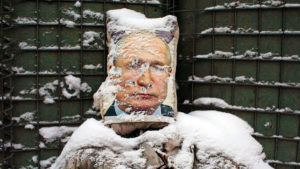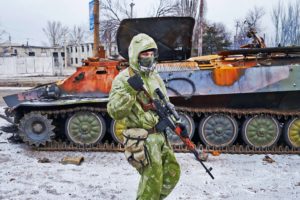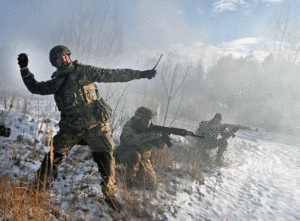“He’s lost his fucking mind.” It’s Monday night, and I’m speaking to my friend, the American-Ukrainian author Vladislav Davidzon. We have both just watched Vladimir Putin’s televised speech from the Kremlin, and he — like Putin — is no longer mincing words. He lives in Ukraine; he can no longer afford to.
Last week, I wrote that the idea of an all-out invasion of Ukraine and a march on Kyiv, touted so often by Joe Biden, made no sense. As it stood, the world hung on Putin’s every move: Russia had cemented its superpower status — and all this was achieved without the need to fire a single shot. Putin had won gold; he had leverage without cost. That would change with a full invasion — and what would be the point of that?
But I did caveat all this: “It may well be that after 20 years of acting like a Tsar, he has gone mad, like so many before him, and something crazy is coming.”
Judging by his speech on Monday, he may well have gone mad, and the crazy may well be coming. It was as if Putin was finally able to say what he’d been thinking for 20 years. What most concerned me, beyond the content, was the tone. It was a combination of self-pity with a sense of utter superiority; a toxic mix which always, always leads to violence. “You didn’t want us to be friends,” he told the West, “but you didn’t have to make an enemy of us.”
Three things became clear from his controlled and detailed rant. Firstly, that he is obsessed with the idea that the West is determined to “Keep Russia Down”; and secondly, that he does not even accept the idea of Ukraine. He claimed, falsely, that it had never really been an independent state; he also said it was “madness” that republics were allowed to leave the Russian Empire. Thirdly, and perhaps most disturbingly, it became clear that this is no longer just about Ukraine (if indeed it ever was). Every former Soviet state is, by implication, now in the firing line.
This was the performance of a man who has been the Tsar of Russia for two decades. A man surrounded only by flatterers and “yes men”, who now seems to use even his inner circle as little more than a rubber stamp for his delusions. But it was also the performance of a man who had weathered the pandemic locked away from other humans, with his head buried in dodgy Soviet books on Ukraine history.
The climax of the speech was, of course, the decision — accompanied by an official signing of the relevant documents, no less — to recognise the “separatist republics” of Donetsk and Luhansk, the two areas of the Donbas region in eastern Ukraine that Russia de facto carved out in 2014 when it sent troops across the border to aid a nominally spontaneous separatist uprising that emerged in response to the Maidan Revolution.
I was there on the ground as pro-Russian separatists aided by the Russian military seized municipal buildings and took control of key cities. There was very little that was spontaneous about it all, and it was clear even then that they were taking orders from Moscow. Soon the Russian hardware began to roll across the border. The Ukrainians duly rolled out an anti-terror operation in response, and the fighting began. A peace of sorts was eventually signed in Minsk and an uneasy stasis held for almost eight years.
But on Monday, Putin blew all that up. The regions will now be recognised as autonomous states. Ukraine has been officially sundered. Now Russia plans to send troops across the border for “peacekeeping” purposes, though Putin clarified yesterday that they would not necessarily go in “right now”.
The morning after the night before is fraught. I spent Monday night speaking to friends in Ukraine. “Tired,” said Viktoria when I asked her how she felt. “Just tired of this never-ending stress.” She continued: “I don’t want to think about the economic crisis that will follow, my possible death, my destroyed country… But I don’t want to run away in panic because it’s my land. Few of the people I know here are frightened. We are irate — you can feel a sense of unity everywhere.”
My friend, Dmitri, is less sanguine. “I was sceptical about talk of an invasion,” he told me. “But after hearing about the annexation in Donbas, I started to panic. I read Putin’s tweets. He is a high functioning psychopath. Any scenario now is bad, isn’t it? We might be trapped.” And yet it’s not just my many Ukrainian friends I now fear for. I also fear for my Russian ones. Russia is going to become an even darker and more repressive place. And they will pay, as surely as Ukrainians will, for Putin’s creeping madness.
So, what next? Well, Putin has telegraphed his next move; now we must, too. Already the talk from the EU and Washington is of sanctions. Yesterday, Prime Minister Boris Johnson came out and announced a new package: he has sanctioned five banks and three Russian oligarchs with ties to Putin. Germany, meanwhile, has said Nord Stream 2, the gas pipeline on which so much of Russia’s energy leverage over Europe relies, is to be put on hold. All of which sounds like it could be a game-changer, but don’t be fooled. I’ll believe it when I see it. I’d wager the Kremlin feels the same.
Of course, it’s a start — and amid the chaos we must remain calm. Right now, it’s important to remember that nothing has changed on the ground. Even in Donetsk, the centre of global attention, the influx of more soldiers does not actually alter the status quo. It may prove to be the launching point for something larger, but right now what was in Russian control remains so. Yes, it looks like that’s going to change — perhaps irretrievably. And like everyone who cares about geopolitics and, more immediately, who cares about Ukraine, I am angry. But for now, we must eschew hysteria.
For no matter how repulsed we are by his behaviour, if Putin wants a war we must do whatever we can not to give it to him. On Monday, I watched him look into the camera and say of the Ukrainians that he could “break their bones”, and I knew he meant it. He could and he would. That man would shell cities, would send a million to camps — and he would do it without hesitation and without pity.
We must not push him into it. Instead, we should do what we should have done years ago: we enable Putin’s kleptocracy and it’s time to stop being Russia’s butler. This means no more London laundromat, no more friendly banks, no more cosying up from Eton; no more nice lawyers and art galleries and big houses. Enough is enough. We were told that we left the EU for reasons of national sovereignty. Well, if that were really the case then there has never been a better time to take back control — from Russia.
Perhaps the greatest tragedy is that all this and more could have been achieved years ago. We could have stopped him in Georgia. We could have stopped him in Syria. We could have stopped him in Crimea. We could have stopped him in Eastern Ukraine. But we did nothing. And here we are.
Disclaimer
Some of the posts we share are controversial and we do not necessarily agree with them in the whole extend. Sometimes we agree with the content or part of it but we do not agree with the narration or language. Nevertheless we find them somehow interesting, valuable and/or informative or we share them, because we strongly believe in freedom of speech, free press and journalism. We strongly encourage you to have a critical approach to all the content, do your own research and analysis to build your own opinion.
We would be glad to have your feedback.
Source: UnHerd Read the original article here: https://unherd.com





